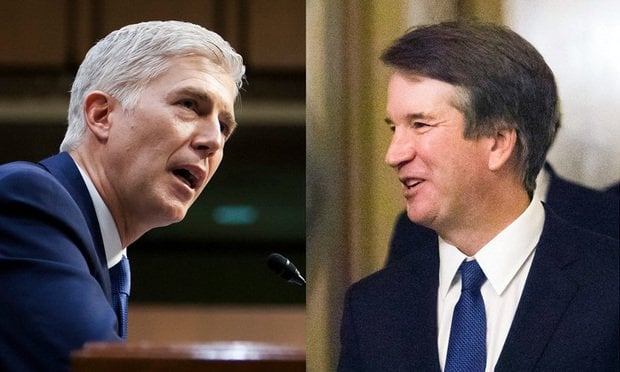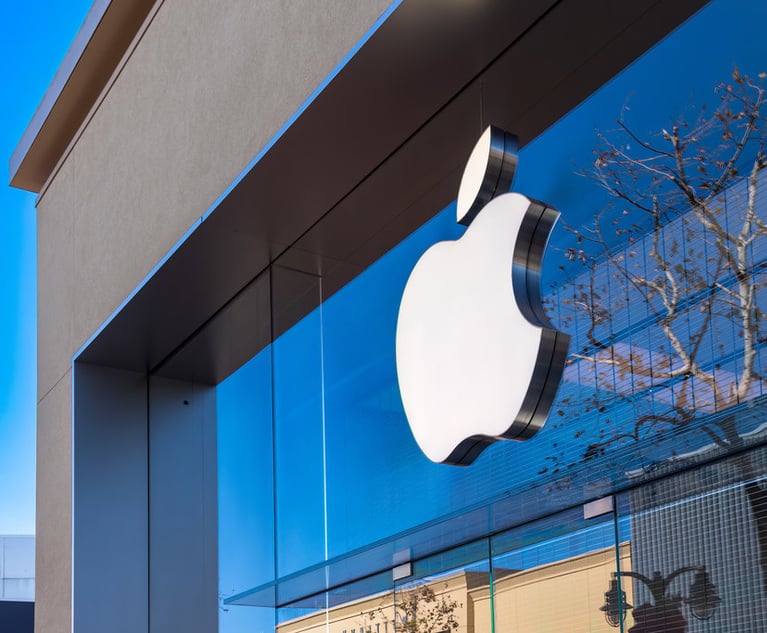Antitrust Suit Over Apple's App Store Prices Gets SCOTUS Go-Ahead
The majority decision, written by Justice Brett Kavanaugh, said the plaintiffs are direct purchasers who can sue Apple over the prices paid in its app store.
May 13, 2019 at 12:20 PM
3 minute read
 Justices Neil Gorsuch (left) and Brett Kavanaugh (Photos: Diego M. Radzinschi/ALM)
Justices Neil Gorsuch (left) and Brett Kavanaugh (Photos: Diego M. Radzinschi/ALM)
Apple must face an antitrust lawsuit brought by consumers who claim the Silicon Valley tech giant has a monopoly over its app store that allows it to overcharge customers.
Monday's majority decision from the U.S. Supreme Court, written by Justice Brett Kavanaugh, said the plaintiffs are direct purchasers under the court's Illinois Brick Co. v. Illinois decision, despite claims to the contrary by Apple. Monday's majority decision upholds a ruling from the U.S. Court of Appeals for the Ninth Circuit, which had overturned a district court.
Illinois Brick held that only the first buyer from an unlawful monopoly can claim treble damages under federal antitrust laws, even if an overcharge has been passed through to indirect or subsequent buyers.
The underlying consumer class action contends Apple's “wholly-owned, monopoly app store” overcharges for apps and distorts the market at the supply chain and at the retail chain.
“It is undisputed that the iPhone owners bought the apps directly from Apple,” Kavanaugh wrote. “Therefore, under Illinois Brick, the iPhone owners were direct purchasers who may sue Apple for alleged monopolization. That straightforward conclusion follows from the text of the antitrust laws and from our precedents.”
In rejecting Apple's argument that it's the app developers who set the price, the majority said the company's theory would provide a road map for monopolistic retailers or suppliers to evade antitrust claims.
“That restructuring would allow a monopolistic retailer to insulate itself from antitrust suits by consumers, even in situations where a monopolistic retailer is using its monopoly to charge higher-than-competitive prices to consumers,” Kavanaugh wrote. “We decline to green-light monopolistic retailers to exploit their market position in that way. We refuse to rubber-stamp such a blatant evasion of statutory text and judicial precedent.”
Justices Ruth Bader Ginsburg, Stephen Breyer, Sonia Sotomayor and Elena Kagan joined the majority.
Monday's decision, which did not address the merits of the underlying claims, came after the justices appeared skeptical of Apple's claims during oral arguments in November. Apple's lawyer, Latham & Watkins partner Daniel Wall, told the justices that, although Apple collects a 30 percent commission on each app, the app developers set the sales price. Apple is simply the distributor of the apps.
The only first buyer with standing to sue Apple, Wall argued, is the app developer who pays the 30% commission.
U.S. Solicitor General Noel Francisco supported Apple's position in the case, Apple v. Pepper.
In dissent, Justice Neil Gorsuch, joined by Justices Clarence Thomas and Samuel Alito and Chief Justice John Roberts, said the majority is recasting Illinois Brick to allow plaintiffs to sue Apple for passing on the cost imposed by developers.
“This replaces a rule of proximate cause and economic reality with an easily manipulated and formalistic rule of contractual privity,” Kavanaugh wrote. “That's not how antitrust law is supposed to work, and it's an uncharitable way of treating a precedent which—whatever its flaws—is far more sensible than the rule the Court installs in its place.”
David Frederick, a partner at Kellogg, Hansen, Todd, Figel & Frederick, had the winning argument for the consumer class.
This content has been archived. It is available through our partners, LexisNexis® and Bloomberg Law.
To view this content, please continue to their sites.
Not a Lexis Subscriber?
Subscribe Now
Not a Bloomberg Law Subscriber?
Subscribe Now
NOT FOR REPRINT
© 2025 ALM Global, LLC, All Rights Reserved. Request academic re-use from www.copyright.com. All other uses, submit a request to [email protected]. For more information visit Asset & Logo Licensing.
You Might Like
View All

'A Never-Ending Nightmare': Apple Sued for Alleged Failure to Protect Child Sexual Abuse Survivors

False Representations Suit in Trophy Design Dispute Survives Challenge
4 minute read
Jury Says $118M: Netlist Wins Another Patent Verdict Against Samsung
4 minute readTrending Stories
- 1SDNY US Attorney Damian Williams Lands at Paul Weiss
- 2Litigators of the Week: A Knockout Blow to Latest FCC Net Neutrality Rules After ‘Loper Bright’
- 3Litigator of the Week Runners-Up and Shout-Outs
- 4Norton Rose Sues South Africa Government Over Ethnicity Score System
- 5KMPG Wants to Provide Legal Services in the US. Now All Eyes Are on Their Big Four Peers
Who Got The Work
Michael G. Bongiorno, Andrew Scott Dulberg and Elizabeth E. Driscoll from Wilmer Cutler Pickering Hale and Dorr have stepped in to represent Symbotic Inc., an A.I.-enabled technology platform that focuses on increasing supply chain efficiency, and other defendants in a pending shareholder derivative lawsuit. The case, filed Oct. 2 in Massachusetts District Court by the Brown Law Firm on behalf of Stephen Austen, accuses certain officers and directors of misleading investors in regard to Symbotic's potential for margin growth by failing to disclose that the company was not equipped to timely deploy its systems or manage expenses through project delays. The case, assigned to U.S. District Judge Nathaniel M. Gorton, is 1:24-cv-12522, Austen v. Cohen et al.
Who Got The Work
Edmund Polubinski and Marie Killmond of Davis Polk & Wardwell have entered appearances for data platform software development company MongoDB and other defendants in a pending shareholder derivative lawsuit. The action, filed Oct. 7 in New York Southern District Court by the Brown Law Firm, accuses the company's directors and/or officers of falsely expressing confidence in the company’s restructuring of its sales incentive plan and downplaying the severity of decreases in its upfront commitments. The case is 1:24-cv-07594, Roy v. Ittycheria et al.
Who Got The Work
Amy O. Bruchs and Kurt F. Ellison of Michael Best & Friedrich have entered appearances for Epic Systems Corp. in a pending employment discrimination lawsuit. The suit was filed Sept. 7 in Wisconsin Western District Court by Levine Eisberner LLC and Siri & Glimstad on behalf of a project manager who claims that he was wrongfully terminated after applying for a religious exemption to the defendant's COVID-19 vaccine mandate. The case, assigned to U.S. Magistrate Judge Anita Marie Boor, is 3:24-cv-00630, Secker, Nathan v. Epic Systems Corporation.
Who Got The Work
David X. Sullivan, Thomas J. Finn and Gregory A. Hall from McCarter & English have entered appearances for Sunrun Installation Services in a pending civil rights lawsuit. The complaint was filed Sept. 4 in Connecticut District Court by attorney Robert M. Berke on behalf of former employee George Edward Steins, who was arrested and charged with employing an unregistered home improvement salesperson. The complaint alleges that had Sunrun informed the Connecticut Department of Consumer Protection that the plaintiff's employment had ended in 2017 and that he no longer held Sunrun's home improvement contractor license, he would not have been hit with charges, which were dismissed in May 2024. The case, assigned to U.S. District Judge Jeffrey A. Meyer, is 3:24-cv-01423, Steins v. Sunrun, Inc. et al.
Who Got The Work
Greenberg Traurig shareholder Joshua L. Raskin has entered an appearance for boohoo.com UK Ltd. in a pending patent infringement lawsuit. The suit, filed Sept. 3 in Texas Eastern District Court by Rozier Hardt McDonough on behalf of Alto Dynamics, asserts five patents related to an online shopping platform. The case, assigned to U.S. District Judge Rodney Gilstrap, is 2:24-cv-00719, Alto Dynamics, LLC v. boohoo.com UK Limited.
Featured Firms
Law Offices of Gary Martin Hays & Associates, P.C.
(470) 294-1674
Law Offices of Mark E. Salomone
(857) 444-6468
Smith & Hassler
(713) 739-1250








